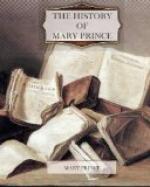be free is very sweet. I will say the truth to
English people who may read this history that my good
friend, Miss S——, is now writing
down for me. I have been a slave myself—I
know what slaves feel—I can tell by myself
what other slaves feel, and by what they have told
me. The man that says slaves be quite happy in
slavery—that they don’t want to be
free—that man is either ignorant or a lying
person. I never heard a slave say so. I
never heard a Buckra man say so, till I heard tell
of it in England. Such people ought to be ashamed
of themselves. They can’t do without slaves,
they say. What’s the reason they can’t
do without slaves as well as in England? No slaves
here—no whips—no stocks—no
punishment, except for wicked people. They hire
servants in England; and if they don’t like them,
they send them away: they can’t lick them.
Let them work ever so hard in England, they are far
better off than slaves. If they get a bad master,
they give warning and go hire to another. They
have their liberty. That’s just what we
want. We don’t mind hard work, if we had
proper treatment, and proper wages like English servants,
and proper time given in the week to keep us from
breaking the Sabbath. But they won’t give
it: they will have work—work—work,
night and day, sick or well, till we are quite done
up; and we must not speak up nor look amiss, however
much we be abused. And then when we are quite
done up, who cares for us, more than for a lame horse?
This is slavery. I tell it, to let English people
know the truth; and I hope they will never leave off
to pray God, and call loud to the great King of England,
till all the poor blacks be given free, and slavery
done up for evermore.
[Footnote 16: The whole of this paragraph especially,
is given as nearly as was possible in Mary’s
precise words.]
[Footnote 17: She means West Indians.]
[Footnote 18: A West Indian phrase: to fasten
or tie up.]
SUPPLEMENT
TO THE
HISTORY OF MARY PRINCE.
BY THE EDITOR.
Leaving Mary’s narrative, for the present, without
comment to the reader’s reflections, I proceed
to state some circumstances connected with her case
which have fallen more particularly under my own notice,
and which I consider it incumbent now to lay fully
before the public.
About the latter end of November, 1828, this poor
woman found her way to the office of the Anti-Slavery
Society in Aldermanbury, by the aid of a person who
had become acquainted with her situation, and had advised
her to apply there for advice and assistance.
After some preliminary examination into the accuracy
of the circumstances related by her, I went along
with her to Mr. George Stephen, solicitor, and requested
him to investigate and draw up a statement of her
case, and have it submitted to counsel, in order to
ascertain whether or not, under the circumstances,




